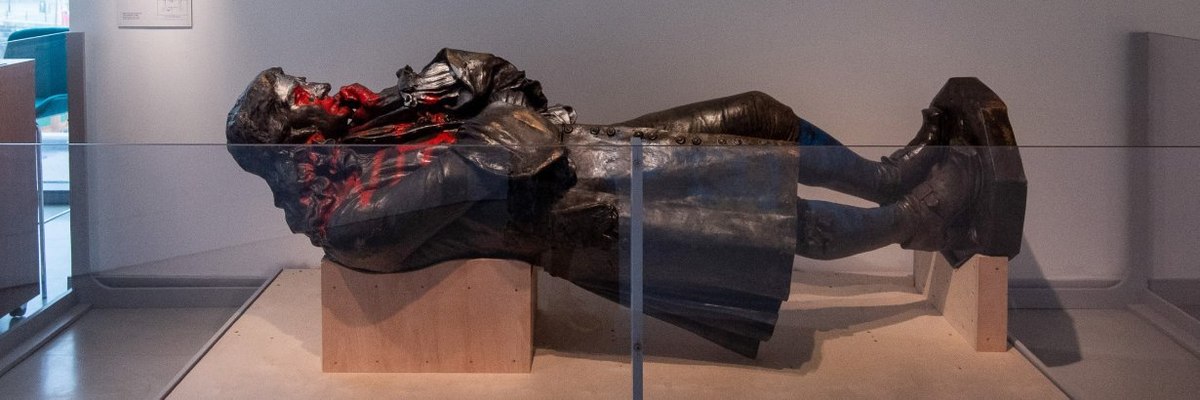It was, by any of the usual legal standards, an open and shut case. Four men and women stood accused of criminal damage after they had torn down the statue of the slave trader Edward Colston and rolled it into Bristol harbour. They did not deny doing so. Indeed it would have been futile for them to have tried. Hundreds of people were in the crowd when it happened and millions more watched the television pictures of them doing it. And yet the jury in their case found them not guilty. The Attorney General is now considering referring the case to the Court of Appeal. Trial by jury is regarded by most of us as a vital element in our system of justice and an essential guardian of our democratic liberty. Is it right that politicians should intervene or should the verdict be allowed to stand, however perverse it may seem? And if it does stand are we condoning what amounts to a ‘vandals’ charter’?
The so-called ‘Colston Four’ have never made any attempt to deny their actions. Eighteen months ago they were part of a Black Lives Matter protest demanding the removal of Edward Colston from its prominent place on Bristol harbour. The statue was attacked by many in the crowd, daubed with paint and ripped off its pedestal. It was then rolled down to the harbour wall and tipped over. The police made no attempt to stop them. Many months later ten of the protesters were arrested. Six of them were given ‘restorative justice’ sentences and fined £100. The Colston Four were prosecuted and duly appeared in court. They pleaded not guilty and claimed the presence of the statue was a hate crime. It was therefore not an offence to remove it.
They made no attempt to deny what they had done but they claimed it was justified on the basis of Colston’s notorious behaviour. One of their barristers, Liam Walker, told the jury: ‘Make no mistake... your decision is not just going to be felt in this courtroom or this city. It will reverberate around the world. I urge you all to be on the right side of history’.
Mr Walker apologised for those remarks after the trial judge, Peter Blair QC, raised concerns. He told the jury to ‘focus their decision-making’ on the defendants’ accounts of what had happened and not on the ‘wider impact’ of the statue’s removal. He said those remarks should be disregarded and it would be ‘quite wrong’ if jurors felt they had ‘some kind of additional burden on their shoulders.’
Boris Johnson appeared to agree. He made no direct comment on the verdict but he has said that those who want to remove statues they find offensive should do so ‘democratically’ people should not “go around seeking retrospectively to change our history”. He is not alone in that view.
The former justice secretary Robert Buckland said urgent action was needed to iron out any ‘ambiguity in the law’. Other MPs voiced concerns that the verdict had set a dangerous precedent that could lead to juries acquitting defendants for political reasons rather than according to the evidence. One of their concerns is that a leading historian, David Olusoga, was allowed to give evidence at the trial. Professor Olusoga is not exactly impartial. He has confessed that he himself ‘desperately’ wanted to join the Colston protesters. He has accused Winston Churchill of the equivalent of modern-day ‘war crimes’. His critics say his appearance as a witness changed it from being a criminal trial into a political one.
They also make the point that historical evidence – however appalling Colston’s behaviour may have been – was simply not relevant to the trial. It was not about history, they say, it was about the destruction of public property.
Olusoga himself argues that it was entirely appropriate to put history at the centre of the trial. The jury could not and should not ignore what Colston had done. His statue, he said, ‘depicted a man whose wealth was based on the enslavement of 84,000 men, women and children’. He was complicit in the death of 19,000 of them, who died, ‘squirming in agony, chained to the decks’ of his company’s slave ships.’
Obviously, no civilised human being would even try to defend Colston or the vile slave trade in these more enlightened times. But in any case, it was not Colston who was on trial. The question is whether the jury was right to acquit the Colston Four and what effect this case might have on those who stage political protests in future. Some fear it gives them carte blanche to commit as much damage and destruction as they wish just so long as they can argue that their cause, viewed through the lens of history, is a just one.
The attorney general Suella Braverman has said the verdict is causing “confusion” and she is “carefully considering” whether to use powers which allow her to seek a review so senior judges have the chance to “clarify the law for future cases”.
The acquittal cannot be overturned and the defendants cannot be retried without fresh evidence.
The Attorney General said on Twitter: “Trial by jury is an important guardian of liberty and must not be undermined. However, the decision in the Colston statue case is causing confusion.
“Without affecting the result of this case, as Attorney General I am able to refer matters to the Court of Appeal so that senior judges have the opportunity to clarify the law for future cases. I am carefully considering whether to do so.”
The Criminal Justice Act 1972 allows the Attorney General, following a submission from the Crown Prosecution Service (CPS), to ask a higher court to clarify a point of law but it is not a means to change the outcome of an individual case.
A CPS spokesman said: “The decision to charge was made following detailed consideration of the evidence in accordance with our legal test.
“We are considering the outcome of the case but, under the law, the prosecution cannot appeal against a jury acquittal.”
A petition calling for a retrial and claiming the acquittal set a “dangerous precedent that endangers all of our national heritage”, has so far attracted more than 5,000 signatures.
So what’s your view? Do you believe that the acquittal makes a mockery of the rule of law... that criminal damage is by definition a criminal offence and therefore should be punished?
Do you worry that those who take exception to certain national monuments or statues will now feel they are entitled to deface or even destroy them so long as they can claim they are acting from pure motives and they are legitimate targets? In short do you believe we are at risk of allowing a ‘vandals’ charter’?
Even more important: do you believe this verdict has damaged confidence in our jury system and, if so, what should the government do about it?
Let us know what you think.







